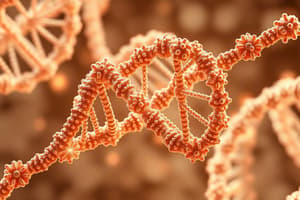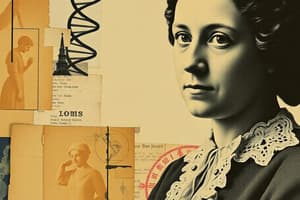Podcast
Questions and Answers
What specific scientific technique did Rosalind Franklin utilize to reveal the structure of DNA?
What specific scientific technique did Rosalind Franklin utilize to reveal the structure of DNA?
- Nuclear Magnetic Resonance
- X-ray Crystallography (correct)
- Mass Spectrometry
- Infrared Spectroscopy
In which year did Rosalind Franklin produce her significant image of crystalline DNA?
In which year did Rosalind Franklin produce her significant image of crystalline DNA?
- 1955
- 1953
- 1952 (correct)
- 1947
At which institution did Rosalind Franklin lead the X-ray research for DNA structural studies?
At which institution did Rosalind Franklin lead the X-ray research for DNA structural studies?
- University of Paris
- University of Cambridge
- Birkbeck College
- King's College, London (correct)
Which other researchers were prominent in the quest to determine DNA's molecular structure around the same time as Franklin?
Which other researchers were prominent in the quest to determine DNA's molecular structure around the same time as Franklin?
What significant impact did Rosalind Franklin's work have on the field of biology?
What significant impact did Rosalind Franklin's work have on the field of biology?
What was the primary focus of Rosalind Franklin's research after leaving King's College?
What was the primary focus of Rosalind Franklin's research after leaving King's College?
Which of the following statements about Photograph 51 is true?
Which of the following statements about Photograph 51 is true?
What can be inferred about the recognition of Rosalind Franklin's contributions during her lifetime?
What can be inferred about the recognition of Rosalind Franklin's contributions during her lifetime?
What significant model did Franklin propose related to the tobacco mosaic virus?
What significant model did Franklin propose related to the tobacco mosaic virus?
Which aspect of Maurice Wilkins' achievements is highlighted in the content?
Which aspect of Maurice Wilkins' achievements is highlighted in the content?
Flashcards
What is X-ray crystallography?
What is X-ray crystallography?
A scientific technique that uses X-rays to determine the arrangement of atoms in a crystal, revealing its three-dimensional structure.
Who was Rosalind Franklin?
Who was Rosalind Franklin?
Rosalind Franklin was a British chemist who played a pivotal role in understanding the structure of DNA. Her research using X-ray diffraction helped to reveal its double helix shape.
Why was the discovery of DNA's structure so significant?
Why was the discovery of DNA's structure so significant?
The discovery of DNA's double helix structure was a major turning point in biology, as it paved the way for understanding how genetic information is stored and passed on.
How was Rosalind Franklin's work recognized?
How was Rosalind Franklin's work recognized?
While Franklin's work was instrumental in uncovering DNA's double helix structure, it wasn't fully recognized during her lifetime. Her contributions, however, were essential to our understanding of genetics.
Signup and view all the flashcards
What other areas did Rosalind Franklin research?
What other areas did Rosalind Franklin research?
Franklin's research in X-ray crystallography extended beyond DNA to include studying the structure of viruses, specifically those affecting crops.
Signup and view all the flashcards
What did Photograph 51 illustrate?
What did Photograph 51 illustrate?
Photograph 51, taken by Rosalind Franklin, revealed the helical structure of DNA, showing that it's made up of two strands with the backbone on the outside.
Signup and view all the flashcards
How did Franklin's work impact the discovery of DNA's structure?
How did Franklin's work impact the discovery of DNA's structure?
Franklin's work on DNA's structure, specifically Photograph 51, was essential to Watson and Crick's Nobel Prize-winning model, but she died before receiving recognition.
Signup and view all the flashcards
How was Franklin's contribution to the discovery of DNA's structure recognized?
How was Franklin's contribution to the discovery of DNA's structure recognized?
While Wilkins, Watson, and Crick received recognition in 1962 for their DNA work, Franklin's contributions were overlooked during her lifetime.
Signup and view all the flashcards
What other areas did Franklin research?
What other areas did Franklin research?
Franklin's research went beyond DNA to include the study of viruses, especially plant viruses like TMV (tobacco mosaic virus) and the human polio virus.
Signup and view all the flashcards
How does Franklin's legacy continue through financial support?
How does Franklin's legacy continue through financial support?
Wilkins, a Nobel Prize winner, received a grant to study polio, highlighting the importance of continued research, while Franklin's legacy is preserved through her bequest to support a fellow scientist.
Signup and view all the flashcardsStudy Notes
Rosalind Franklin's Contributions to DNA Research
- Rosalind Franklin was a British chemist born in 1920.
- She earned a degree in physical chemistry and later a doctorate, both from Cambridge University.
- She studied X-ray crystallography in Paris, a technique using X-rays to study substance structure.
- Her expertise in this field was crucial to understanding DNA.
- Franklin's work in the 1950s was critical to understanding DNA, a significant 20th-century scientific challenge.
- Franklin created the first detailed image of DNA's crystalline structure in 1952, revealing its double helix shape.
- Photograph 51, taken by Franklin, produced the first clear image of DNA, revealing its crystalline structure.
The Race to Understand DNA
- Scientists globally were competing to discover DNA's structure in the 1950s.
- This involved scientists studying DNA's molecular structure.
- James Watson and Francis Crick in Cambridge, England, were also among these researchers.
- Their work built upon Franklin's foundational research, leading to a breakthrough.
- Franklin's work was pivotal in revealing the double helix structure of DNA.
Franklin's Work in Cambridge
- In 1951, Franklin was appointed to head X-ray research at King's College, London.
- This involved a team of physicists, biologists, and biochemists.
- The goal was to investigate physical processes in biology, a new field of study.
- This work overlapped with, and built upon, prior efforts to understand DNA's structure.
- The research team worked to determine the physical processes in biology, using X-rays to examine biological samples.
Studying That Suits You
Use AI to generate personalized quizzes and flashcards to suit your learning preferences.





